Over 30 years of anarchist writing from Ireland listed under hundreds of topics
VIDEOCRACY: Broadcasting Control over the Italian Psyche - review
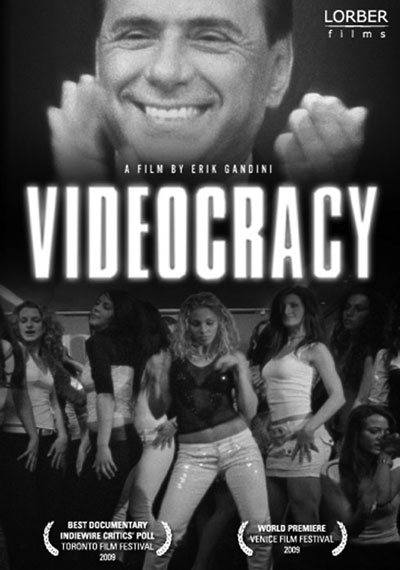 Erik Gandini’s “Videocracy” is an intriguing and distressing documentary film that explores Silvio Berlusconi’s media empire, and the deep impact that it has had on Italian society and culture. Gandini’s investigative endeavour was released in 2009, but the trailers were blocked on the six main Italian television channels, which are controlled by Berlusconi. It was a tacit form of censorship aimed at obstructing Videocracy’s popularity, the alleged reason for doing so being that it was offensive to Berlusconi’s reputation. This backfired completely as the block created mass-hype about the film, and when it was screened at the Venice Film Festival it was received by a huge audience and accolades.
Erik Gandini’s “Videocracy” is an intriguing and distressing documentary film that explores Silvio Berlusconi’s media empire, and the deep impact that it has had on Italian society and culture. Gandini’s investigative endeavour was released in 2009, but the trailers were blocked on the six main Italian television channels, which are controlled by Berlusconi. It was a tacit form of censorship aimed at obstructing Videocracy’s popularity, the alleged reason for doing so being that it was offensive to Berlusconi’s reputation. This backfired completely as the block created mass-hype about the film, and when it was screened at the Venice Film Festival it was received by a huge audience and accolades.
Garret "the Good"?
Former Taoiseach Garret Fitzgerald's death was announced this morning. As is usual in such circumstances we are being subject to a load of old guff, very rarely in such instances are we treated to an honest assessment of a mans life instead we are expected to believe in the individauls perfection. The great phrases you will hear for the next week will be that he was "a patriot who always put the national interest first", "an honest man, a fair man", "he did the state some service" etc. At least the last is true, Garret Fitzgerald was a thouroughly pro-state, pro-capitalist, pro-EU, pro-imperialist politician. He never wavered in his support for the capitalist order.
The Crisis and Core & Periphery in the Eurozone - Peripheral Vision
 At the same time that we are witnessing a wave of popular protest in North Africa and the Middle East against aged and corrupt neo-colonial dictatorships, in the heart of Europe we are witnessing something unprecedented and absolutely extraordinary.
At the same time that we are witnessing a wave of popular protest in North Africa and the Middle East against aged and corrupt neo-colonial dictatorships, in the heart of Europe we are witnessing something unprecedented and absolutely extraordinary.
History appears to moving in the ‘wrong direction’ in the so-called peripheral countries of the Eurozone.
Review: The Kronstadt Rebellion, Still Significant 90 Years on
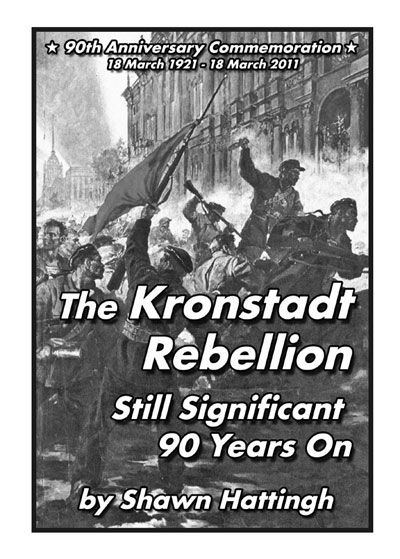 Zabalaza Books, the anarchist printing project linked to the Zabalaza Anarchist Communist Front (ZACF) in South Africa, recently produced this pamphlet to commemorate the Kronstadt uprising in March 1921, when the sailors and workers of the Kronstadt naval base rose up against the Bolsheviks and were slaughtered by the dictatorship.
Zabalaza Books, the anarchist printing project linked to the Zabalaza Anarchist Communist Front (ZACF) in South Africa, recently produced this pamphlet to commemorate the Kronstadt uprising in March 1921, when the sailors and workers of the Kronstadt naval base rose up against the Bolsheviks and were slaughtered by the dictatorship.
British Queen's Dublin Castle banquet protested by a few hundred as Garda harass activists
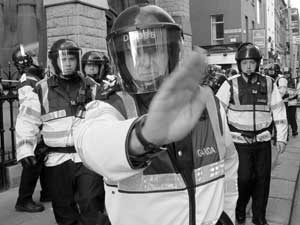 About 250 people took part in the éirígí organised march on the banquet for the British Queen staged in Dublin castle last night. WSM members joined the demonstration but Garda had intercepted the person transporting our flags and banner to the protest leaving us somewhat invisible. This was part of a pattern of suppression of visible protest that occurred throughout the visit of the British Queen despite Garda claims that they would "facilitate protest" in advance of the visit.
About 250 people took part in the éirígí organised march on the banquet for the British Queen staged in Dublin castle last night. WSM members joined the demonstration but Garda had intercepted the person transporting our flags and banner to the protest leaving us somewhat invisible. This was part of a pattern of suppression of visible protest that occurred throughout the visit of the British Queen despite Garda claims that they would "facilitate protest" in advance of the visit.
Dublin - march on the banquet of the British and Irish elite in Dublin castle
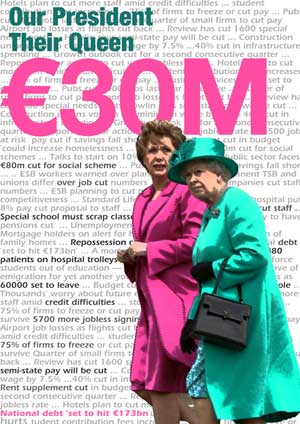 Some 30 million euro is being wasted between the visits of the US President & the British Queen to Ireland. One of the grosser occasions of the visit of the British Queen will be tonight (Wed 18 May) when the royal parasite will be sitting down to stuff her face with our local wealthy 1% at Dublin Castle. The WSM is planning to join the eirigi organised March on the Castle from 5.30pm on Wednesday, May 18th at St Catherine’s Church on Thomas Street, Dublin 8. The march will depart for Dublin Castle at roughly 6.30pm. The protest which will include speeches, music and street theatre is expected to last until at least 8.30pm.
Some 30 million euro is being wasted between the visits of the US President & the British Queen to Ireland. One of the grosser occasions of the visit of the British Queen will be tonight (Wed 18 May) when the royal parasite will be sitting down to stuff her face with our local wealthy 1% at Dublin Castle. The WSM is planning to join the eirigi organised March on the Castle from 5.30pm on Wednesday, May 18th at St Catherine’s Church on Thomas Street, Dublin 8. The march will depart for Dublin Castle at roughly 6.30pm. The protest which will include speeches, music and street theatre is expected to last until at least 8.30pm.
We will be carrying a large new banner reading "Old Ruler, New Rulers : Class Struggle Continues .." highlighting the common purpose of the Irish and British elites in keeping Ireland safe for capital. If your feeling a little outraged by this and all the disruption of the visits we'll see you there, on the streets.
Why we don't welcome the visit of the British Queen

The British Queen - An enemy of the working class, an enemy of the poor, head of the imperialist British state, symbol of privilege, inequality and oppression.
The visit: why now?
There is a drive to normalise the British occupation of the six counties and partition. It is part of a wider pattern to integrate Ireland into the loose alliance of imperialist nations. There has always been a desire on behalf of the British state, the USA and the European Union to engage Ireland as a junior partner in the imperialist club. The ending of the war in the north and the gradual normalisation of relations between Britain and Ireland has allowed an acceleration of this process. The visit of Britain's Queen Elizabeth is all part of it.
Windsor and Obama visits: Good for Tourism?
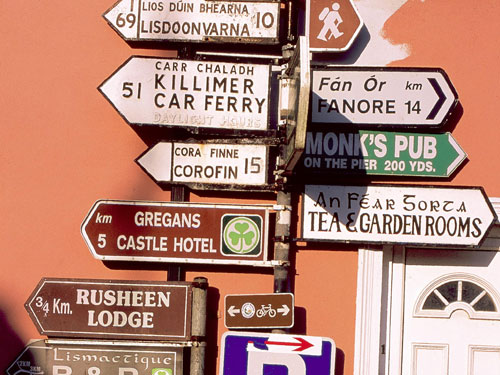 At the moment, the predominant view in the Government , the media and in business circles is that the two large, high-profile state visits by the British Queen and the US President will give a massive boost to Ireland, both in terms of increasing tourism and in terms of improving Ireland's current image of a bankrupt and disfunctional isle in the eye's of the world's media.
At the moment, the predominant view in the Government , the media and in business circles is that the two large, high-profile state visits by the British Queen and the US President will give a massive boost to Ireland, both in terms of increasing tourism and in terms of improving Ireland's current image of a bankrupt and disfunctional isle in the eye's of the world's media.
However, is this viewpoint accurate? It seems to me to be a naive and ill-thought out endeavour, without thinking seriously about the facts and implications.
Film Night: Chop Shop director Ramin Bahrani, Wednesday 18th May, at 8pm
Chop Shop director Ramin Bahrani Chop Shop is the story of Alejandro a street smart Latino orphan on the verge of adolescence, who works in a Chop Shop ( an illegal breakers yard that sells on stolen car parts ). The Chop Shop is in a sprawling junkyard on the outskirts of Queens, New York.
In this chaotic world of adults, young Alejandro struggles to make a better life for himself and his 16-year-old sister, Isamar.
“ Touching, funny, sad and beautifully observed” Time Out
“ Flawlessly Observed… an unforgiving parable of American economic reality “..Screen International
Spring Talks: Cork Labour and the Irish Revolution, 1916-1922 -Dr. John Borgonovo Tuesday, May 17, 8pm
Solidarity Books is pleased to present the fourth and last talk in our Spring Talks Series: Public consciousness of ‘Rebel Cork’ during the War of Independence conjures images of the martyred Lord Mayors, the burning of the city centre, and flying column ambushes at Kilmichael and elsewhere. However, less obvious and less violent activities were equally important to the success of the independence movement.

